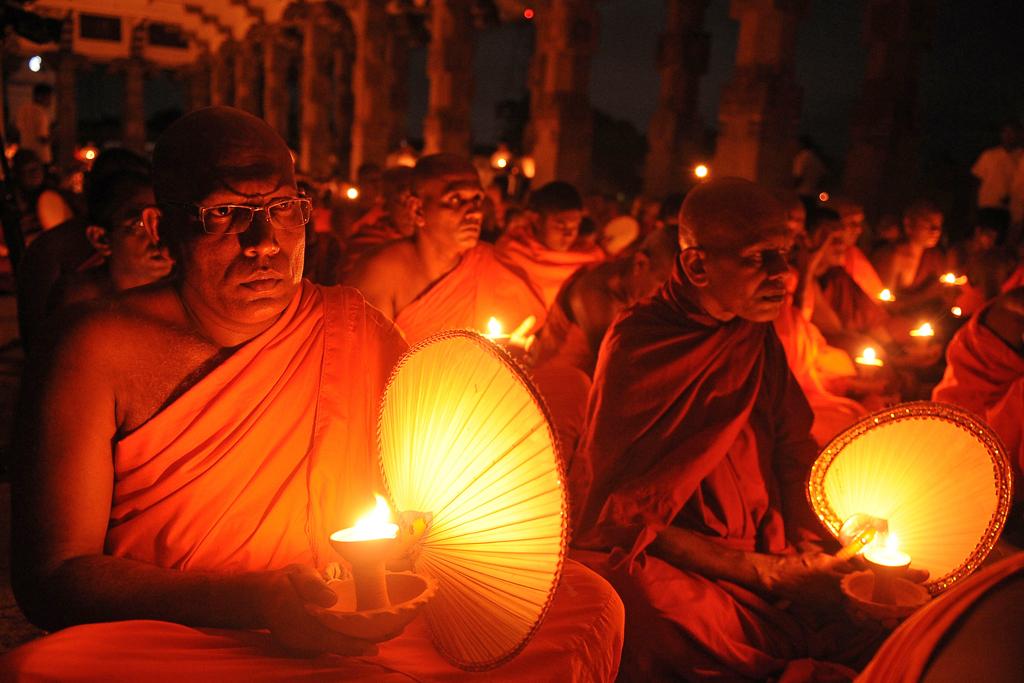Opinion: UN should do more on Sri Lanka
Sri Lanka’s national heritage party the Jathika Hela Urumaya (JHU) activists and Buddhist monks staged a peaceful sit in protest in Colombo, May 3, 2011 against the U.N. Secretary General Ba Ki Moon’s advisory panel report against Sri Lanka. The report called for the setting up of an independent investigation to inquire into alleged war crimes. The U.N. report highlighted “credible allegations” that both the Sri Lankan army and Tamil Tiger rebels had been involved in violations that could amount to war crimes or crimes against humanity.
LOS ANGELES — An independent report on the conduct of the final months of the war in Sri Lanka that so many people have long asked for has finally been released by the United Nations.
It is an even-handed and devastating account of how Tamil people were brutalized by Sri Lanka's government and its military on the one hand, and the Tamil Tigers who claimed to be protecting them on the other.
But the Sri Lankan government began downplaying the U.N. report as inaccurate and biased weeks before it became public — and therein lies a fundamental problem to bringing lasting peace to the island: Colombo sees the search for truth and accountability as an exercise in spin control and denial, since so much blame lies at its doorstep.
This fact underscores the need for a more formal and in-depth, international probe of Sri Lanka’s 26-year war, and the need for the U.N. Security Council to play a more robust role in demanding that probe. It is essential that the United States uses its leadership to push for an investigation to air the truth, and that other members of the Security Council do so as well.
The new U.N. report — an authoritative, 196-page look at the final months of the conflict, commissioned by U.N. Secretary General Ban Ki-moon — demonstrates why a fuller account is necessary.
The report confirmed what many in the international community had suspected. In the closing days of the war, Sri Lankan government forces shelled hospitals and food distribution centers and gathered ethnic Tamil civilians in “no fire zones” and shelled those locations, all the while claiming a policy of “zero civilian casualties.”
The report also condemns the Liberation Tiger Tamils of Eelam (LTTE) for grave transgressions, including the point-blank shooting of civilians attempting to flee the combat zone where they were used as human shields, and for forcefully enlisting child soldiers on a war that they were poised to lose.
This grim catalogue of atrocities is just the first step in the search for truth, and it shows why a deeper investigation is needed.
In the war’s final stages and its aftermath, tens of thousands of Tamil civilians were slaughtered. Survivors long for closure. They search for a sense of justice, security and normalcy in a country whose Orwellian government continues to minimize the extent of damage and wrongdoing, dismissing dissenters as terrorists.
Although the U.N. report is a powerful indictment, the panel that wrote it serves only in an advisory role to Secretary General Ban.
Three well-respected international human rights attorneys wrote the U.N. report: Marzuki Darusman, the former attorney general of Indonesia and a member of the National Commission of Human Rights in Indonesia; Yasmin Sooka, who served as a commissioner for South Africa’s Truth and Reconciliation Commission, which successfully paved the way for sustained peace in South Africa following the end of apartheid; and Steven Ratner, an international law expert, human rights attorney and University of Michigan law professor.
To launch a full-blown, international investigation of the war, Ban has said the Sri Lankan government must agree — which is unlikely — or the probe must be ordered by an inter-government body, such as the U.N. Security Council or the U.N. Human Rights Council.
Sri Lanka argues that it has set up its own Lesson’s Learned and Reconciliation Commission (LLRC) to investigate the war, but no previous government-appointed panel has ever held anyone accountable, and the LLRC is widely regarded as a charade.
In fact, the new U.N. report says that the LLRC has no mandate for accountability. The United States, which has stood on the sidelines of this conflict for too long and supports the LLRC process, should accept that judgment, demand justice for all Sri Lankans, and call for an impartial, international investigation.
And if the Sri Lankan government feels it has nothing to hide, it should welcome the expertise of the U.N. and its proven track record for ameliorating ethnic conflicts. An LLRC white-wash will not help achieve reconciliation. It will only fuel more division.
Thousands of innocent men, women and children were killed in the final months of the war. And 300,000 survivors, all Tamils, were subjected to internment, deprivations, sexual abuse and disappearances, all amounting to ethnic cleansing. These people and their families deserve to know who was responsible, and to have them held accountable.
As the most recent report recommended, the U.N. should investigate its own conduct in failing to protect the Tamil population. The United States must show the world it will not tolerate war crimes and crimes against humanity going uninvestigated and unpunished.
Dr. Karunyan Arulanantham, M.D., is a member of the Tamil American Peace Initiative, a group of Tamil Americans formed to help bring lasting peace, justice, democracy and good governance to Sri Lanka, and to focus attention on the destruction of Tamil communities and culture caused by the war.
We want to hear your feedback so we can keep improving our website, theworld.org. Please fill out this quick survey and let us know your thoughts (your answers will be anonymous). Thanks for your time!
